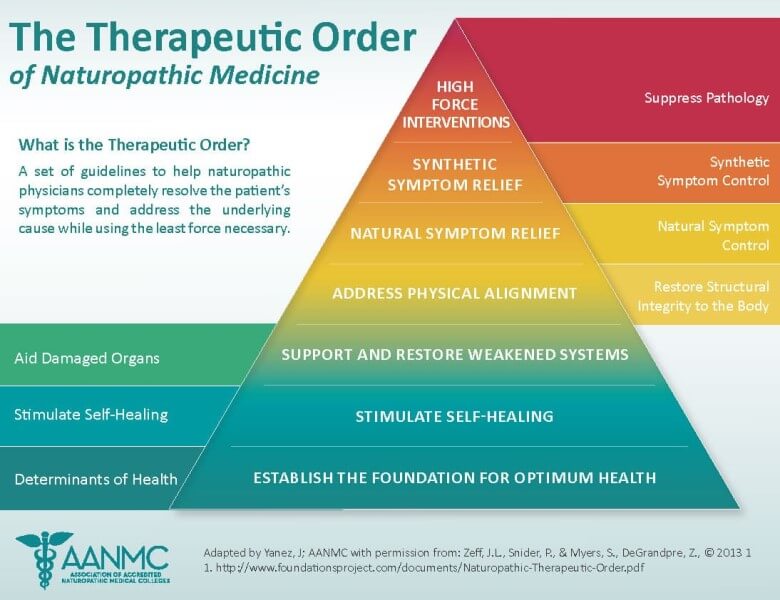Support Your Immune System Through Establishing a Good Foundation of Health

One of the most important things you can do to prevent illness is to have a good foundation of health in place. A helpful tool to refer to is the Naturopathic Therapeutic Order. It is a hierarchy of healing that aims to treat the underlying causes of disease starting with the least invasive yet often most effective therapies. If you are like me, a visual aid can really help solidify this concept of foundations of health - it’s the soil from which you grow a good immune system and optimize health.

Without these foundations in place, higher-level therapies cannot work as efficiently. If we skip the foundations, our vitality starts out lower and thus there is an increased need for higher-level interventions such as pharmaceuticals in order to get better. I could spend forever talking about each tier of the therapeutic order but in this blog I will only cover the first and most important therapeutic guideline at the bottom of the pyramid.
Diet
In the midst of limited grocery store selection, frozen vegetables, meat, beans, and rice can go a long way. Adequate vegetable intake is important not only during this time when you are trying to prevent illness. Vegetables provide vitamins and minerals that are essential for immune and gut health, growth, and prevention of cancer with its antioxidant properties. Getting enough vegetables is especially important if you experience high blood pressure, elevated blood sugar, high cholesterol, heartburn, cancer, trouble with weight loss, or constipation. Vegetables are a good source of coenzyme Q10 (CoQ10) which is an antioxidant that plays an important role in heart health and can reduce markers of inflammation such as c-reactive protein (CRP) levels. They are a great source of fiber which helps regulate blood sugar by slowing down digestion. Aim for 4-5 cups of vegetables per day. Uncooked vegetables are higher in vitamin and fiber content and cooked vegetables are higher in mineral content. Each individual vitamin and mineral has specific uses but simply getting a wide variety of vegetables both cooked and uncooked each day will ensure a healthy dose of each.
NaturoMedica’s dietitian Mackenzie Schiltz is posting recipes on social media (under NaturoMedica) using nonperishable items that are delicious and easy to make. She will be outlining how exactly to maintain this particular foundation of health with fewer trips to the grocery store and using what you already have in your home. Be sure to check out our Facebook and Instagram page for those recipes.

Water
Water is a powerful tool for moving blood through the body. It helps increase our body’s metabolic processes which in turn supports immune cell trafficking and detoxification. Dehydration is an underlying cause of many common conditions such as blood pressure dysregulation, fatigue, dry skin, and chronic pain. Water lubricates our skin and relieves chronic constipation. Be sure to filter your water with a trusted filtration system. This is something that you can speak to your physician about.
The causes of pain can be narrowed down into one theme: congestion. Inflammation is the congestion of white blood cells in the area of healing. There could be congestion of fluid in your ears, in your joints, or in your head. This congestion could lead to headaches and pain. Congestion of energy in your mental realm causes anxiety and depression. All types of congestion can be ameliorated with increasing water and circulation through active movement. Which brings me to the next foundation of health.
Exercise
Movement, stretching, weight-training, walking, bicycling, running, meditation - all of which can be considered exercise depending on your particular goal. Most of these things you can do in your home if you are practicing social distancing. You can work the recommended 30 minutes of aerobic exercise daily in your living room.
Aim for a heart rate of 50-80% of your maximum (maximum = 220 - age) depending on your fitness level at least a third of the duration of the workout. If your body allows it, try to break a sweat for at least 10 minutes per day. The skin is one of the largest detox organs of the body and one of the five elimination channels. For bone and muscle health, strength-training 30 minutes every other day can help to stimulate bone formation and increase muscle tone for joint stabilization. Weight-training can mean anything from walking up stairs, to doing bodyweight squats to participating in Olympic weightlifting.
If you are new to weight training it is ideal to start with a personal trainer or group exercise class so that you have guidance for practicing good form and getting maximum results for your effort. Stretching is sometimes underrated but as a part of your daily routine, it can feel as good as a massage and can work wonders for quieting the mind down at the end of your day. In every type of exercise I have mentioned you can find yourself in a meditative state. Many runners and yogis can relate to this and it can be enough to keep them motivated.
It is best to practice your intense exercises during your natural cortisol surge in the morning between 6-10 am. Cortisol is an energy hormone produced by your adrenal glands that’s responsible for getting you up in the morning. Cortisol responds to sunlight. Morning exercise allows you to be active prior to an exhausting work day and is less likely to interfere with your sleep.

Sleep
With the kids and spouse at home and potentially without a regular schedule for mealtime, exercise time, and sleep time, the various hormones throughout your body that keep your metabolism and immune system intact may be compromised. Inadequate sleep can affect your motivation for staying on a healthy eating and exercise regimen which then affects quality of sleep that following night and thus the vicious cycle continues. Reset your body by focusing on your sleep. Aim for bedtime around 9-10:30 pm every night, falling asleep within 15 minutes and staying asleep for a full 7 hours. Aim for waking up well-rested and motivated to start your day. This is your ideal sleep schedule and very few of us can say yes to all of these questions. If you’re one of the lucky few, your hormones from your thyroid, adrenals, gut, brain, and many more organs thank you. This is because your hormones are affected when your circadian rhythm is disturbed by interrupted sleep. The circadian rhythm is your body’s internal clock that regulates hormonal and metabolic balance over a 24-hour cycle. The main pacer of the internal clock is located in your brain and is largely modulated by the sunlight (or artificial light) and darkness. Hormones such as cortisol (regulates blood pressure and generates energy), melatonin (which stimulates sleep), reproductive hormones (responsible for production of estrogens, testosterone), prolactin (which stimulates lactation), thyroid hormone (regulates energy and metabolism), and growth hormone (stimulates cell growth) oscillate on a daily basis accordingly. Nutrient-sensitive hormones such as insulin (transports glucose), leptin (promotes satiety), ghrelin (responsible for hunger), and adiponectin (regulates glucose and fat breakdown) all operate best when you are exposed to sunlight between 7-9 am and darkness between 9-10:30 pm.
Many factors can contribute to sleep disturbance and it is best to talk this through with your healthcare provider. Some potential areas to explore may involve your gut health, anxiety levels, hormone changes (pregnancy, menopause), blood sugar stabilization, hydration practices, sleep hygiene, and liver health.
**We are offering telemedicine appointments to all patients, current or new. It is a user-friendly and preventative approach to continuing your health journey.
Spirit and Emotions
S T R E S S is a common emotion among many of us especially during these times of uncertainty. This is a good time to maintain focus on establishing your foundations of health, practicing good hand washing hygiene, and minimizing your exposure to public gatherings over 10 people. But those things may not be enough to clear stress from your mind. Stress can deplete energy stores used to keep your immune system running. The mind is powerful but it can oftentimes only focus on one thing at a time. You can use this to your advantage by focusing on positive thoughts and various things that may be meditative for you. Find one piece of happiness each day. Use grounding techniques such as deep breathing and better yet with your bare feet in the grass to help connect your mind with your body. You can also walk around in your home with your bare feet and notice how the floor feels beneath every joint in your toes and muscle in your foot. This is important as you begin to feel that being present with your physical body can help steer your mind toward the present moment. If you experience an excess of other emotions such as sadness, fear or anger, working through these emotions in the long-run will also be an important part of your overall health. Having a healthy spirit will allow you to live a fuller more meaningful life than you can with having a healthy physical body alone. If you are looking for extra resources and support, be sure to contact your doctor. One such technique that she may tell you about is called cognitive behavioral therapy which works to change your pattern of thought to a more constructive strategy in given situations. For example, you may employ a ‘Mona Lisa’ half-smile during stressful situations such as traffic jams and work meetings, or the repercussions of the pandemic we are in. Working with your primary care physician can help you figure out what type of therapy will be most beneficial for you.
These foundations of health will help strengthen your physical and spiritual body to prevent illness as well as decrease duration and severity of the illness if you become sick. Establishing these foundations also allows your body to become most responsive to any supplemental or pharmaceutical treatment given by your healthcare provider. In the midst of the viral madness many of you are also suffering from environmental allergies. A robust foundation of health increases tolerance to environmental allergens by building a more resilient immune system.


